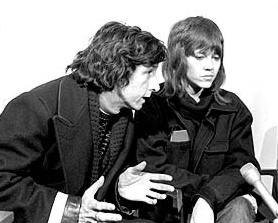
Tom Hayden and Jane Fonda being interviewed after their return from North Vietnam.
Hayden’s Hell
FrontPageMagazine.com
By Kathy Shaidle
It is a disgraceful and shameful name for all those who opposed communism with honor in Southeast Asia four decades ago.
The superstar anti-Vietnam War activist, one of the infamous “Chicago 7” defendants, is still making sure that name of shame is connected with Vietnam — the tragic nation he helped destroy in the 1960s and ’70s through his collaboration with the North Vietnamese Communists. After having made a lucrative career out of hating his own country and the free economy on which it is based, Hayden, now aged 67, is evidently going strong.
Unsurprisingly, the latest utterance of the one-time president of the radical Students for a Democratic Society will do little to enhance his already fading and self-created reputation as a supposed forward-thinking visionary.
The March 10, 2008, issue of Nation magazine carried a long essay by Hayden entitled “The Old Revolutionaries of Vietnam.” A poorly written, passive-voice exercise in self-pity, Hayden’s essay recounts his return to the Southeast Asian country he visited throughout the 1960s and ’70s. As detailed in DiscovertheNetworks.com:
Among the most visible and outspoken mouthpieces of the pro-Communist camp during the Vietnam War era, in the early 1970s Hayden organized — along with his wife Jane Fonda, John Kerry, and Ted Kennedy — an ‘Indo-China Peace Campaign’ (IPC) to cut off American aid to the regimes in Cambodia and South Vietnam. The IPC worked tirelessly to help the North Vietnamese Communists and the Khmer Rouge (led by Pol Pot) emerge victorious.
“Hayden and Fonda took a camera crew to Hanoi and to the ‘liberated’ regions of South Vietnam to make a propaganda film titled Introduction to the Enemy (1974) whose purpose was to persuade viewers that the Communists were going to create an ideal new society based on justice and equality.
That “new society based on justice and equality” ultimately witnessed the murder of 2.5-million Indochinese peasants by Hayden’s revolutionary heroes. But the author of the hippie manifesto, “The Port Huron Statement,” is not about to let all those corpses get in the way of his narcissistic nostalgia trip for the Nation:
During Christmas 2007 I traveled back in time with my family, to Vietnam, for the first time in thirty-two years,” Hayden writes. “I was feeling a deep need to see the place once more, a regret at having withdrawn from a country I had visited four times during the war. I wanted to understand the long-term lessons and, on a personal basis, track down the Vietnamese guides and translators, men and women, who assumed an ideological faith in the American ‘people’ they escorted through ruins inflicted by the American ‘enemy.’ (…) Most were survivors of the French and American wars and would be in their 80s by now. Were they still alive? How had they suffered? After the exuberance at their victory and reunification after 1975, how had they adjusted to a Vietnam without war?
That opening paragraph sets the tone for the rest: oddly chosen scare quotes, plenty of question marks, and plenty of self-obsession.
Those first-person pronouns are real. Musing upon an old photo of himself, Hayden can’t resist claiming, for example, that he’s gained a mere ten pounds in the intervening thirty-five years. But Hayden’s questions are mostly rhetorical. He still subscribes to the stale Marxist theory he first swallowed whole in his early twenties. As he finds out to his dismay, however, most Vietnamese don’t.
“Not even Vietnam [itself] can shake him,” writes Robert Fulford, in a scathing takedown of Hayden’s preening travelogue. “Its economy grows swiftly and so does its per capita GDP. It’s a single-party state, still using the name Communist Party, and it has economic freedom without the other kinds of liberty. During his trip, a leading Vietnamese novelist told him, ‘Some Americans may sympathize with communism, but I lived under it and couldn’t stand it.’ The novelist has a son making millions traveling for a high-tech corporation.”
The only resident of Vietnam more distressed than Hayden by all this prosperity is – not surprisingly – another former American anti-war activist turned ex-patriot and capitalist: Gerry Herman is a now successful film distributor, and even he just seems irritated because China is getting better trade deals than his adopted country.
“Far be it from me,” says Hayden, “to question the desire of the Vietnamese to share our globalized consumer culture like everyone else.”
But of course, Hayden does just that, for thousands of workmanlike words. What else can he do, having devoted his entire adult life to fighting American capitalism and “imperialism” in book after book, and demonstration after demonstration? Unlike those of many of his contemporaries, Hayden’s Communist sympathies were no mere fashionable pose.
As his former fellow radical David Horowitz recalled:
Hayden and I were deadly serious about our revolutionary agendas. During the Vietnam War, Tom traveled many times to North Vietnam, Czechoslovakia and Paris to meet communist North Vietnamese and Viet Cong leaders. He came back from Hanoi proclaiming he had seen “rice roots democracy at work.” (…) Hayden offered tips on conducting psychological warfare against the U.S. He arranged trips to Hanoi for Americans perceived as friendly to the Communists and blocked entry to those seen as unfriendly, like the sociologist Christopher Jencks. He attacked as “propaganda’ stories of torture and labeled American POWs returning home with such stories as “liars.”
And Hayden’s “revolutionary” activities were not confined to traitorous oversees excursions:
On the domestic front, Hayden advocated urban rebellions and called for the creation of “guerrilla focos” to resist police and other law enforcement agencies. For a while he led a Berkeley commune called the “Red Family,” whose “Minister of Defense” trained commune members at firing ranges and instructed high school students in the use of explosives. He was also an outspoken supporter of the violence-prone Black Panther Party.
Today, Hayden allows himself to wonder – in only the most tentative manner, of course, with the usual disingenuous rhetorical questions – whether or not he and his radical comrades might have been wrong all along:
“The question,” Hayden writes, “is whether the future, aside from the obvious advantages of peace, will be worth the sacrifices of the past. Is the period of anticolonial revolution–which Vietnam symbolized and so dominated our thinking in the ’60s and beyond–becoming an obsolete memory in the era of globalization? Has the promise of those inspiring revolutions faded with the decline of naked colonialism and the emergence of so many corrupt authoritarianisms in the Third World? Or are the supposedly scientific models of history long embraced by the left being replaced with a kind of chaos theory of unpredictability? Is this all that was ever possible?”
The natural desires of ordinary people, be they American or Vietnamese, to trade in goods and services, to enjoy decent food and housing and to exercise their basic human rights, are summarily dismissed as “chaotic” and “unpredictable” by an obviously shaken Tom Hayden. (No doubt Adam Smith would be mystified and perhaps amused to hear capitalism compared to quantum physics.)
Hayden’s only hope of achieving equilibrium is to do the unthinkable: humbly renounce his delusions. Fortunately, he has a couple of timely examples to imitate should he care to do so.
Robert Fulford noted the delightful coincidence of Hayden’s Nation essay appearing at the same time as a Village Voice column by the acclaimed playwright David Mamet, entitled “Why I Am No Longer A ‘Brain Dead Liberal.’” Mamet chronicles his somewhat reluctant journey from Left to Right, such as his newfound respect for corporations and limited government.
“It may seem odd,” Fulford remarks, “that a much-admired writer makes such a noise about the banal fact that he thinks the society he’s always lived in is grounded in sound principles and operates reasonably well. But in his milieu, that opinion remains big news.”
More “big news” was made shortly thereafter by another playwright. Writing in the Sunday Times of London, Tom Stoppard issued a remarkably similar declaration. Even in its soixante-neuf heyday, admits Stoppard, he considered the Left “politically dubious,” writing that he “was embarrassed by the slogans and postures of rebellion in a society which, in London as in Paris [in 1968]. . . seemed to me to be the least worst system into which one might have been born — the open liberal democracy whose very essence was the toleration of dissent.”
The way it looks now, Tom Hayden will resist joining Stoppard and Mamet to his dying day. And when all is said and done, he can never undo the enormous damage he helped perpetrate upon millions of Indo-Chinese people. Longing for a Vietnam that now mirrrors everything he wished to destroy, the anti-war activist now faces his destiny: going down in history as, at best, a pathetic footnote or a cryptic joke, and at worst, an accessory to mass murder and oppression ultimately repudiated even by the oppressors.

Wild Thing’s comment……..
For me Tom Hayden, Jane Fonda, John Kerry, and the others that all stood on the side of the enemy during the Vietnam War have blood on their hands for LIFE and beyond. There is no place even in hell that would do justice for the deaths they caused of our soldiers, and contributing their propaganda to the horrendous treatment of our POW’s.
This is an excellent article about Tom Hayden and how he is less then nothing then ever before.
 ….Thank you Mark for sending this article to me.
….Thank you Mark for sending this article to me.

He’s gotten it backwards.
Under communism/socialism, no one has anything except the crooked politicians at the top.
Look at what it’s done to China, to N Korea, to N Vietnam and the Soviet lands. People standing in line for hours for toilet paper!
Please, you pseudo-intelligent idiots, go away–go really live in one of the communist nations and see how far you go with your big mouths.
You only saw what you wanted to see. You didn’t look at the whole picture, did you? How many American boys died because of you? Don’t you have any soul in there at all? You cared more for the enemy than you did your own nation. You are a traitor and should be shot by firing squad.
So Hayden still promotes evil and servitude as utopia. Yet, he is disappointed because so much of the post colonial Third World has turned into “corrupt authoritarianisms”. He is further disappointed that so many ordinary citizens of countries like Vietnam really want American style capitalism.
Poor Tom. He is confused and disappointed. His dreams of a socialist world have failed just like his marriage to fellow Marxist Jane Fonda failed. I wonder if at times he does think of all the carnage that resulted from his actions. Perhaps in eternity he will have to confront those souls. That will be his real Hell.
hayden and fonda should have faced a firing squad.
Thanks Mark & WT. Hayden and Fonda both should share the same fate as Benito Mussolini And Clara Petacci for their infamy.
Lynn, LOL I love how you stated this…..
“pseudo-intelligent idiots”….it fits him perfectly. haha
Tom oh how I would love for him to be confronted somehow by them. Those that never had the chance to let him know how they felt about him.
GM Cassel AMH1(AW) USN RET, I agree totally!!!! You are so right and that would have been justice for the traitors they are.
Jack thanks for the video. I agree with you, the deaths Hayden and Fonda caused should demand this kind of punishment.